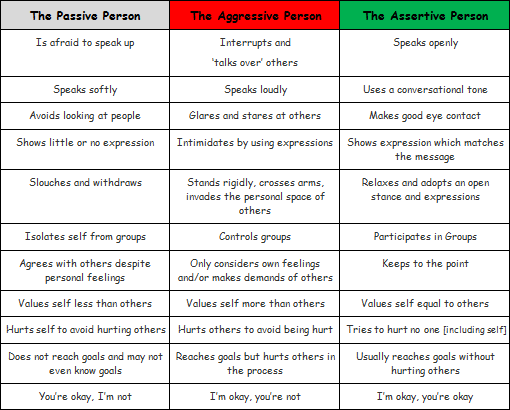Assertiveness
Skills
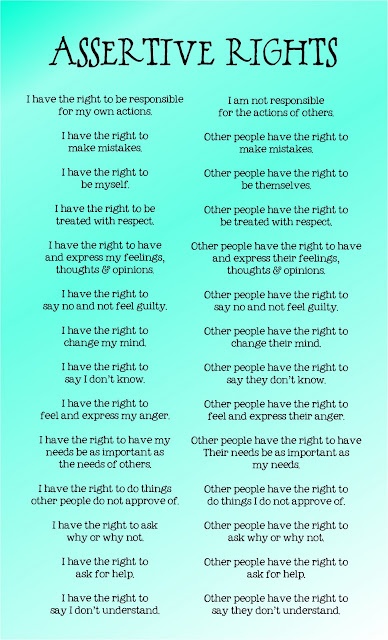
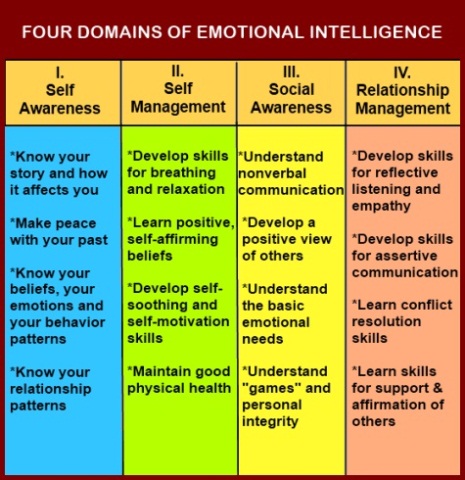
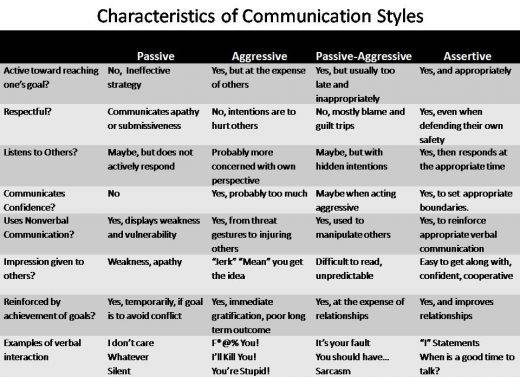
Some people are naturally more assertive than others. If your disposition tends more towards being either passive or aggressive, you need to work on the following skills.
Value yourself and your rights
-
Understand that your rights, thoughts, feelings, needs and desires are just as important as everyone else's.
-
But remember they are not more important than anyone else's, either.
-
Recognise your rights and protect them.
-
Believe you deserve to be treated with respect and dignity at all times.
-
Stop apologizing for everything.
Identify your needs and wants, and ask for them to be satisfied
-
Don't wait for someone to recognize what you need (you might wait forever!)
-
Understand that to perform to your full potential, your needs must be met.
-
Find ways to get your needs met without sacrificing others' needs in the process.
Acknowledge that people are responsible for their own behavior
-
Don't make the mistake of accepting responsibility for the how people react to your assertive statements (e.g. anger, resentment). You can only control yourself.
-
As long as you are not violating someone else's needs, then you have the right to say or do what you want.
Express negative thoughts and feelings in a healthy and positive manner
-
Allow yourself to be angry, but always be respectful.
-
Do say what's on your mind, but do it in a way that protects the other person's feelings.
-
Control your emotions.
-
Stand up for yourself and confront people who challenge you and/or your rights.
Receive criticism and compliments positively
-
Accept compliments graciously.
-
Allow yourself to make mistakes and ask for help.
-
Accept feedback positively – be prepared to say you don't agree but do not get defensive or angry.
Learn to say "No" when you need to
-
Know your limits and what will cause you to feel taken advantage of.
-
Know that you can't do everything or please everyone and learn to be OK with that.
-
Go with what is right for you.
-
Suggest an alternative for a win-win solution.
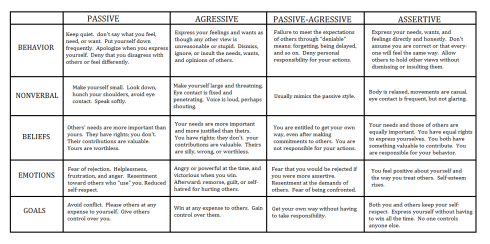
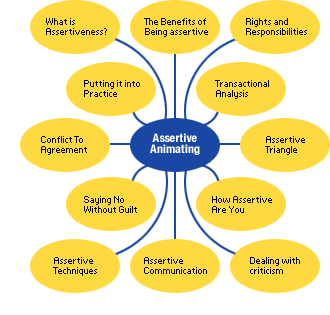

There are a variety of ways to communicate assertively. These can easily be adapted to any situation you are facing.
I statements
Use "I want.", "I need." or "I feel." to convey basic assertions.
I feel strongly that we need to bring in a third party to mediate this disagreement.
Empathy
First, recognize how the other person views the situation:
I understand you are having trouble working with Arlene.
Then, express what you need:
...however, this project needs to be completed by Friday. Let's all sit down and come up with a plan to get it done.
Escalation
This type of assertiveness is necessary when your first attempts are not successful in getting your needs met.
The technique involves getting more and more firm as time goes on. It may end in you telling the person what you will do next if you do not receive satisfaction. Remember though, regardless of the consequences you give, you may not get what you want in the end.
John, this is the third time this week I've had to speak to you about arriving late. If you are late one more time this month, I will activate the disciplinary process.
Ask for More Time
Sometimes, you just need to put off saying anything. You might be too emotional or you might really not know what you want. Be honest and tell the person you need a few minutes to compose your thoughts.
Dave, your request has caught me off guard. I'll get back to you within the half hour.
Change Your Verbs
-
Use 'won't' instead of can't'
-
Use 'want' instead of 'need'
-
Use 'choose to' instead of 'have to'
-
Use 'could' instead of 'should'.
Broken Record
Prepare ahead of time the message you want to convey:
I cannot take on any more projects right now.
During the conversation, keep restating your message using the same language over and over again. Don't relent. Eventually the person is likely to realize that you really mean what you are saying.
I would like you to work on the Clancy project.
I cannot take on any more projects right now.
I'll pay extra for you accommodating me.
I cannot take on any more projects right now.
Seriously, this is really important, my boss insists this gets done.
I cannot take on any more projects right now.
Will you do it as a personal favor?
I'm sorry, I value our past relationship but I simply cannot take on any more projects right now.
Tip:
Be careful with the broken record technique. If you use it to protect yourself from exploitation, that's good. However if you use it to bully someone into taking action that's against their interests, it's manipulative, dishonest and bad.
Scripting
This technique involves preparing your responses using a four-pronged approach that describes:
-
The event: tell the other person exactly how you see the situation or problem.
Jacob, the production costs this month are 23% higher than average. You didn't give me any indication of this, which meant that I was completely surprised by the news.
-
Your feelings: describe how you feel about express your emotions clearly.
This frustrates me and makes me feel like you don't understand or appreciate how important financial controls are in the company.
-
Your needs: tell the other person what you need so they don't have to guess.
I need you to be honest with me and let me know when we start going significantly over budget on anything.
-
The consequences: describe the positive outcome if your needs are fulfilled.
I'm here to help you and support you in any way I can. If you trust me, then together we can turn this around.
Once you are clear about what you want to say and express, it is much easier to actually do it.
Key Points
Being assertive means knowing where the fine line is between assertion and aggression and balancing on it. It means having a strong sense of yourself and acknowledging that you deserve to get what you want. And it means standing up for yourself even in the most difficult situations.
It can be learned and developed, and although it won't happen overnight, by practicing the techniques presented here you will slowly become more confident in expressing your needs and wants. As your assertiveness improves, so will your productivity and efficiency. Start today and begin to see how being assertive allows you to work with people to accomplish tasks, solve problems, and reach solutions.
